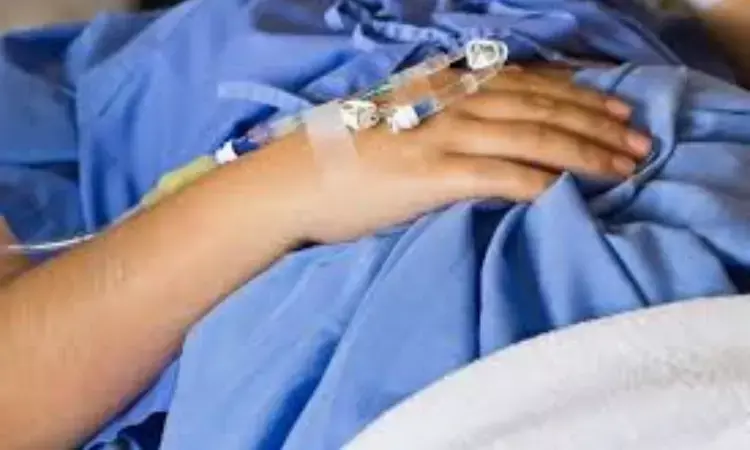- Home
- Medical news & Guidelines
- Anesthesiology
- Cardiology and CTVS
- Critical Care
- Dentistry
- Dermatology
- Diabetes and Endocrinology
- ENT
- Gastroenterology
- Medicine
- Nephrology
- Neurology
- Obstretics-Gynaecology
- Oncology
- Ophthalmology
- Orthopaedics
- Pediatrics-Neonatology
- Psychiatry
- Pulmonology
- Radiology
- Surgery
- Urology
- Laboratory Medicine
- Diet
- Nursing
- Paramedical
- Physiotherapy
- Health news
- Fact Check
- Bone Health Fact Check
- Brain Health Fact Check
- Cancer Related Fact Check
- Child Care Fact Check
- Dental and oral health fact check
- Diabetes and metabolic health fact check
- Diet and Nutrition Fact Check
- Eye and ENT Care Fact Check
- Fitness fact check
- Gut health fact check
- Heart health fact check
- Kidney health fact check
- Medical education fact check
- Men's health fact check
- Respiratory fact check
- Skin and hair care fact check
- Vaccine and Immunization fact check
- Women's health fact check
- AYUSH
- State News
- Andaman and Nicobar Islands
- Andhra Pradesh
- Arunachal Pradesh
- Assam
- Bihar
- Chandigarh
- Chattisgarh
- Dadra and Nagar Haveli
- Daman and Diu
- Delhi
- Goa
- Gujarat
- Haryana
- Himachal Pradesh
- Jammu & Kashmir
- Jharkhand
- Karnataka
- Kerala
- Ladakh
- Lakshadweep
- Madhya Pradesh
- Maharashtra
- Manipur
- Meghalaya
- Mizoram
- Nagaland
- Odisha
- Puducherry
- Punjab
- Rajasthan
- Sikkim
- Tamil Nadu
- Telangana
- Tripura
- Uttar Pradesh
- Uttrakhand
- West Bengal
- Medical Education
- Industry
Immediate PCI as Effective as Staged Approach for STEMI with Multivessel Disease: Network Meta-Analysis

USA: A new network meta-analysis of randomized trials has provided fresh insights into the optimal approach for managing patients with ST-segment-elevation myocardial infarction (STEMI) and multivessel disease. The analysis compared the clinical outcomes of two main revascularization strategies: immediate complete revascularization (nonculprit percutaneous coronary intervention or PCI) versus a staged approach, where revascularization of nonculprit vessels is delayed until after the acute event.
The study, published in the Journal of the American Heart Association, found that immediate and staged revascularization strategies yielded similar long-term clinical outcomes for patients with STEMI and multivessel disease. However, The staged out-of-hospital nonculprit PCI approach was linked to a higher incidence of major adverse cardiovascular events (MACEs) compared to the other strategies, primarily due to an increased risk of ischemia-driven repeat revascularization.
"Staged out-of-hospital PCI was associated with a 67% higher risk of major adverse cardiac events compared to immediate PCI and also resulted in increased rates of ischemia-driven repeat revascularization," the researchers reported.
Ayman Elbadawi from Texas A&M School of Medicine in Bryan, TX, and colleagues sought to clarify the comparative outcomes of immediate, staged in-hospital, and staged out-of-hospital complete revascularization strategies for patients with ST-segment elevation myocardial infarction and multivessel disease.
For this purpose, the researchers conducted an electronic search of MEDLINE, SCOPUS, and Cochrane databases through August 2023 to identify randomized trials evaluating immediate, staged in-hospital, and staged out-of-hospital complete revascularization strategies for patients with STEMI and multivessel disease. The primary outcome of interest was MACEs. The final analysis included data from nine trials involving 4,270 patients, with a weighted follow-up duration of 13.8 months.
The following were the key findings of the study:
- Pairwise meta-analysis revealed no statistically significant difference in MACEs between immediate and staged nonculprit percutaneous coronary intervention (odds ratio 0.79).
- In the network meta-analysis, there was no significant difference in MACEs between immediate PCI and staged in-hospital nonculprit PCI (odds ratio 1.29). However, staged out-of-hospital PCI was associated with a higher risk of MACEs than immediate PCI (odds ratio 1.67).
- Staged out-of-hospital PCI had higher odds of ischemia-driven repeat revascularization than immediate PCI (odds ratio 2.26), while no such increase was seen with staged in-hospital PCI.
- No significant differences were found in other outcomes across the three strategies.
In this network meta-analysis of randomized controlled trials, an immediate nonculprit PCI approach resulted in clinical outcomes similar to those of a staged nonculprit PCI approach for patients with STEMI and multivessel disease who are candidates for complete revascularization. The analysis also revealed that a staged out-of-hospital nonculprit PCI approach was associated with a higher incidence of adverse clinical events than the immediate nonculprit PCI approach.
"These findings suggest that, whenever possible, patients with STEMI and multivessel disease who are candidates for nonculprit PCI should undergo the procedure before discharge," the researchers concluded.
Reference:
Elbadawi A, Hamed M, Gad M, Elseidy SA, Barghout M, Jneid H, Mamas MA, Alfonso F, Elgendy IY. Immediate Versus Staged Complete Revascularization for Patients With ST-Segment-Elevation Myocardial Infarction and Multivessel Disease: A Network Meta-Analysis of Randomized Trials. J Am Heart Assoc. 2024 Oct 29:e035535. doi: 10.1161/JAHA.124.035535. Epub ahead of print. PMID: 39470060.
Dr Kamal Kant Kohli-MBBS, DTCD- a chest specialist with more than 30 years of practice and a flair for writing clinical articles, Dr Kamal Kant Kohli joined Medical Dialogues as a Chief Editor of Medical News. Besides writing articles, as an editor, he proofreads and verifies all the medical content published on Medical Dialogues including those coming from journals, studies,medical conferences,guidelines etc. Email: drkohli@medicaldialogues.in. Contact no. 011-43720751


